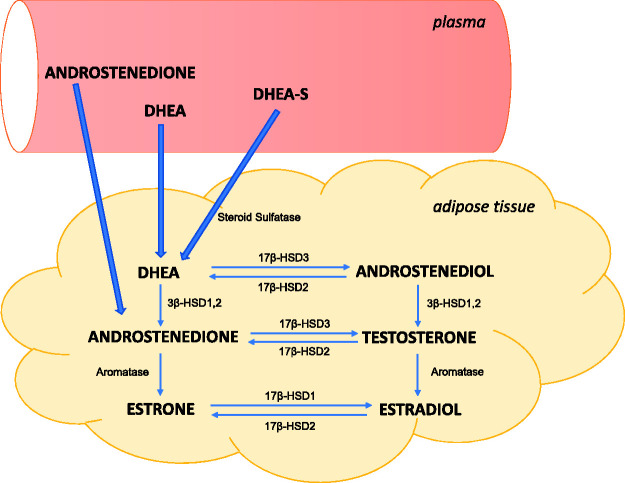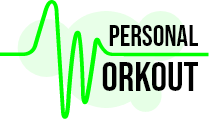PCOS and Why It Can Make Weight Loss Difficult for Women
Polycystic Ovarian Syndrome (PCOS) is a hormonal disorder that affects an estimated 10-20% of women of reproductive age. It is believed to be the most common cause of infertility in women today. However, PCOS also has an impact on weight management, which is why we are increasingly seeing it in the gym. In this blog post, we will take a closer look at the definition of PCOS, the possible causes and the hormonal imbalance. We will also look at the challenges women with PCOS face when trying to lose weight and provide practical tips for effective weight management.
What is PCOS?
Polycystic ovary syndrome is a hormonal disorder characterized by an imbalance of reproductive hormones, insulin resistance, and the formation of small cysts in the ovaries. A diagnosis of PCOS is given to anyone who meets 2 of the following 3 criteria:
- Elevated DHEA or testosterone levels, along with acne and hair growth in unusual places or thinning or loss of hair on the head.
- Absent or irregular menstrual cycles
- Cysts in the ovaries.
What are the symptoms?
Women with PCOS often experience symptoms such as absent or irregular periods, infertility, excessive hair growth in unusual places (such as the face), thinning or loss of hair on the head, depression, and weight gain.
How does PCOS develop?
As mentioned above, it is an imbalance of sex hormones (more details below). This then affects other hormones such as insulin, ghrelin, and leptin, creating a vicious cycle. The cause is unclear. In addition to lifestyle habits, genetic predisposition is also thought to play a role.
In evolutionary terms, it used to be a survival advantage to have slightly reduced fertility and, for example, only 4 children instead of 8. The mother used fewer nutrients and energy and was also stronger due to slightly higher testosterone levels. This genetic variation, which led to a minimization of the enzyme aromatase, which is responsible for the conversion of testosterone into estradiol, may have been further amplified and spread.
Today, endocrine disruptors also interfere with the activity of enzymes. BPA is thought to be one of the worst. These pre-exposures are also passed from mothers to their children. Read more about BPA in the following blog post on why you should drink from glass bottles and avoid environmental toxins.
How does the hormonal imbalance in PCOS manifest itself?
Simply put, there are the following 5 issues or “hormone systems” in which an imbalance may exist. In the following section, we will go into more detail on point 1, which is the main problem in PCOS.
- Excess androgens: PCOS is associated with elevated levels of androgens, also known as “male hormones. Androgens play an important role in regulating metabolism, and their excess can prevent the body from burning calories efficiently. This hormonal imbalance can make it difficult for women with PCOS to lose weight.
- Impaired appetite regulation: Hormonal imbalances in PCOS can affect appetite regulation. Women with PCOS may experience increased hunger and cravings, especially for sugary and high-calorie foods. This can make it difficult to stick to a healthy eating plan and create a calorie deficit for weight loss.
- Insulin resistance: PCOS is often associated with insulin resistance, which means that the body cannot effectively use glucose for energy. This causes the body to produce more insulin, resulting in elevated blood insulin levels. Elevated insulin levels increase fat storage, especially around the abdomen, making it difficult to lose weight.
- Thyroid dysfunction: Some women with PCOS may also have thyroid problems such as hypothyroidism. The thyroid produces hormones that regulate metabolism. When the thyroid is not functioning optimally, it can slow down metabolism and cause weight gain or make it difficult to lose weight.
- Cortisol imbalance: Chronic stress is a common factor in PCOS and can disrupt the delicate balance of cortisol, the primary stress hormone. Elevated cortisol levels can increase appetite, especially for high-calorie and comfort foods. In addition, prolonged stress can contribute to the accumulation of abdominal fat, making weight loss even more difficult.
Steroid hormones and gonadotropins in PCOS in detail
Gonadotropins include LH and FSH. Steroid hormones include estrogens, testosterone, and cortisol. In this blog post about losing weight during menopause, we differentiated between the different estrogens. For this reason, we will not do so here.
As described above, women with PCOS have too many androgens. However, the hormones are often produced in more than one place and act in more than one place, or have different modes of action, which complicates the picture.
25% of androgens are produced in the ovaries before menopause. The brain indirectly stimulates the production of androgens through LH. In the ovaries, the enzyme aromatase converts these to estradiol. However, this conversion of testosterone to estradiol works poorly in PCOS.
The body tries to help itself by storing fat in the abdomen, since fat tissue also produces the aromatase enzyme and contributes up to 50% of total testosterone. However, in the abdominal tissue, aromatase converts androgens to estrone (E1). Estrone is less potent than estradiol (E2).

The remaining 25% of androgens are produced in the adrenal cortex in “healthy” women. This is why they play a central role in PCOS. However, hormones such as prolactin, which is produced in the pituitary gland during lactation, can also be a possible cause of PCOS and levels should always be checked if symptoms are present. Prolactin suppresses LH and FSH, which are responsible for a regular cycle.
Because estrogens also speed up metabolism, women with PCOS have more difficulty losing weight. Even as children, they are often chubbier or reach puberty later than their peers. Estrogen is a key hormone for burning fat in the mitochondria and transporting glucose from the blood into the cells.
Finally, the receptors for the already scarce estradiol are also less sensitive, making it less effective, similar to the enzyme insulin in diabetes.
Why weight loss is important for PCOS
Weight loss is critical to the treatment of PCOS and its associated hormonal imbalances. The benefits of weight loss include
- Improved insulin sensitivity: Weight loss reduces insulin resistance, allows more effective use of insulin for blood sugar control, and reduces fat storage.
- Hormonal balance: It helps regulate androgen levels in the body, leading to a reduction in symptoms such as excessive hair growth and acne. Restoring hormonal balance improves ovulation and fertility and increases the chances of conception for women trying to conceive.
- Reduced inflammation: Obesity, especially abdominal fat, contributes to the chronic inflammation often associated with PCOS. Weight loss can reduce inflammatory markers and decrease the risk of complications such as cardiovascular disease.
Improved metabolic function: Weight loss improves metabolic function, increasing the body’s ability to burn calories efficiently and making it easier to maintain a healthy weight over time.
By managing hormonal imbalances through weight loss, women with PCOS can improve their overall health, achieve better symptom control, and increase their sense of well-being.
What is the best diet for PCOS?
Eating a balanced diet of whole, nutrient-rich foods is important, not only for PCOS, but especially in this case. Processed (including fried) and sugary foods should be strictly avoided, as well as white flour products. Fiber is important. Foods with a low glycemic index, which keep blood sugar levels more stable, are recommended.
Insulin sensitivity is also significantly better in the first half of the day, so it is recommended to eat mainly during this time. In the evening, meals should be small, if any. Eat 2/3 of your calories in the morning and 1/3 in the afternoon. One study showed a 50% decrease in testosterone levels when participants ate this way. Improved insulin management is therefore critical. One way to measure blood glucose levels is described below.
The diet should also be anti-inflammatory and cortisol reducing. Plenty of vegetables, whole grains, nuts and legumes (are phytoestrogens) and healthy fats are important.
We know that the microbiome of women with PCOS is “disrupted” and that leaky gut is common. This has hormonal causes, but often the diet is not yet optimized. Find out which micronutrients are most important below.
What is the best exercise for PCOS?
In addition to strength training, which has several positive effects on PCOS (more muscle mass, higher calorie consumption, metabolic boost, better insulin sensitivity), HIIT is also good. You can learn more about this in this blog post on high-intensity interval training.
Stress management techniques such as meditation, yoga, or deep breathing exercises to lower cortisol levels and manage emotional eating also help.
Yoga, for example, has been shown to have positive effects on testosterone, DHEA, and cycle length in a small group of women with PCOS.
Overall, training and exercise are very important for stabilizing blood sugar levels, improving insulin sensitivity and sleep, stimulating metabolism, and reducing overall weight. However, you should not push yourself to the point of absolute muscle failure or “falling off the treadmill,” as too much stress is counterproductive in PCOS.
What else can be done about slow weight loss, infertility and PCOS?
In addition to the factors already mentioned, biorhythms, often referred to as circadian rhythms, should be mentioned briefly. Estrogen also influences this. However, reducing blue light, for example, can have a positive effect on the suppression of melatonin, which in turn has a positive effect on sleep quality. Since melatonin also has receptors on the ovaries, it may also have a positive effect on fertility. Exposure to sunlight is also important for setting the body clock correctly.
Overall, PCOS is multifactorial. The exact cause, known as the root cause, may be different for each woman. The goal of every trainer and therapist must be to find the root cause and then optimize and supplement it. One way to gain deeper insight is the DUTCH test. We have already explained this in the blog post on figure types. Here we will only discuss the results:
Androgens: You need insight into DHEA/-S and testosterone levels. High androgen levels and increased alpha pathway activity are signs of a problem in this area. Blood sugar management, but also 5a-reductase blockers such as saw palmetto, nettle root, green tea extract (EGCG), pygeum (African plum), reishi mushrooms and zinc are possible supplements.
Estrogens: The various estrogens, such as E1, E2, and E3, also provide information about the underlying problem. If these are low, it means that aromatase activity is low and therefore the conversion of androgens to estrogens is poor.
Supplements that can boost aromatase may help. These include licorice (licorice extract) or white peony. Phytoestrogens such as black cohosh and flaxseed may also help.
Too many estrogens interfere with the clearing process. Cruciferous vegetables or their extracts such as DIM or sulforaphane may help. Rosemary, resveratrol, B vitamins, and magnesium are also helpful.
The adrenal cortex and its hormones: How much does the adrenal cortex contribute to PCO syndrome? This is another question that needs to be answered. If a test shows high levels of free cortisol and cortisone, as well as high levels of metabolized cortisol, then the adrenal cortex may also be (partially) responsible for the high androgen levels. Support for the adrenal cortex is needed by reducing stress, taking B and C vitamins, and supplementing with adaptogens such as King Basil.
Estrogen-progesterone ratio: The hormone progesterone should also be analyzed. Women with PCOS often have low progesterone levels and therefore an unfavorable ratio of the two hormones estrogen and progesterone. This is caused by longer menstrual cycles or, in some cases, the complete absence of menstrual cycles.
In the long term, this can lead to ovarian cysts or an increased risk of ovarian and breast cancer. If progesterone levels are low, supplements such as inositol, fenugreek and chromium may help. NAC, resveratrol, and EGCG are helpful in reducing inflammatory processes, and monk’s pepper (vitex) is the first choice for better regulating the signaling pathway of the hormone LH. Stress levels should also be reduced.
Blood Glucose and Insulin: Blood glucose monitoring can be an important tool in determining which foods or food combinations cause blood glucose levels to rise and by how much. The “white button” on the triceps, often seen in diabetics, is an easy and inexpensive way to find out.
What supplements help with PCOS?
Depending on the problem (see above), saw palmetto, stinging nettle root, green tea extract (EGCG), African plum, reishi and maitake mushrooms, zinc, licorice, white peony, black cohosh, flaxseed, kale, DIM, sulforaphane, rosemary, resveratrol, magnesium, B, C, and D vitamins and adaptogens (King Basil, Roseroot, Ashwagandha), inositol, fenugreek, chromium, NAC, monk’s pepper, turmeric, fish oil or fish eggs, berberine for blood sugar management, L-carnitine, CoQ10, spearmint, chamomile, and glutamine for the gut.
CONCLUSION
Although PCOS requires a holistic approach, it still needs to focus on the root cause, just as we do at Personalworkout.
This requires that factors such as diet, exercise, sleep, and stress management techniques (see above) be “on point” and that tests be done to find the exact cause. Sometimes you need to be open to alternative approaches. For example, hypnosis has been used to “cure” acne. We hope this blog post has shed some light on the subject and we would be happy to discuss it with you in person or conduct tests.
SOURCES
- https://dutchtest.com/podcast/pcos-physiology-and-history/
- https://dutchtest.com/podcast/pcos-diet-and-lifestyle-interventions/
- https://dutchtest.com/blog/the-role-of-adrenals-in-pcos/
- https://dutchtest.com/blog/metabolic-factors-in-pcos/
- https://dutchtest.com/blog/improving-treatment-plans-for-pcos-and-pregnancy/
- https://jilliangreaves.com/blog/2022/1/25/the-best-types-of-exercise-for-pcos
- https://jilliangreaves.com/blog/2021/12/4/when-to-eat-to-support-your-pcos-and-why-meal-timing-matters
- https://pubmed.ncbi.nlm.nih.gov/23688334/
- https://de.wikipedia.org/wiki/Estron
- https://www.hormonspezialisten.de/sexualhormone/testosteron/testosteron-bei-frauen
Challenge of the Month
What Clients Say





















